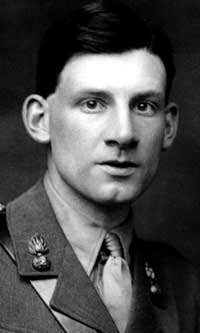 The Hero, by Siegfried Lorraine Sassoon (1886-1967), is one of the disputed war poems this British officer and poet wrote in the period 1915-1918.
The Hero, by Siegfried Lorraine Sassoon (1886-1967), is one of the disputed war poems this British officer and poet wrote in the period 1915-1918.
When The Hero appeared in print, in 1917, many people were shocked. Fellow-officers condemned him. They found the poem caddish, as it could destroy every mother's faith in the report of her son's death.
Sassoon made clear that the poem did not refer to anyone he had known. "But it is pathetically true. And of course the average Englishman will hate it", he remarked - shaping a distance between the 'averages' and 'those who know better'.
Certainly Sassoon was breaking the conspiracy of silence, but many soldiers felt that those at home should be made to realize the full horror, and the ugliness, of the war as much as possible.
Even today Sassoon is still object of discussion. Some find it offensive that he came back from the front and said 'I can't lead men to their death any more'. It implied a monopoly of virtue, as if other officers liked doing it because they acquiesced in their duty.
On the other hand every society needs men who dare to stand up against common convictions. Sassoon did so - with strong opinions and with splendid poems, that will live on for ever.
The Hero
'Jack fell as he'd have wished,' the mother said,
And folded up the letter that she'd read.
'The Colonel writes so nicely.' Something broke
In the tired voice that quivered to a choke.
She half looked up. 'We mothers are so proud
Of our dead soldiers.' Then her face was bowed.Quietly the Brother Officer went out.
He'd told the poor old dear some gallant lies
That she would nourish all her days, no doubt
For while he coughed and mumbled, her weak eyes
Had shone with gentle triumph, brimmed with joy,
Because he'd been so brave, her glorious boy.He thought how 'Jack', cold-footed, useless swine,
Siegfried Sassoon, 1917
Had panicked down the trench that night the mine
Went up at Wicked Corner; how he'd tried
To get sent home, and how, at last, he died,
Blown to small bits. And no one seemed to care
Except that lonely woman with white hair.
Bronnen voor dit artikel -/- Sources for this article.